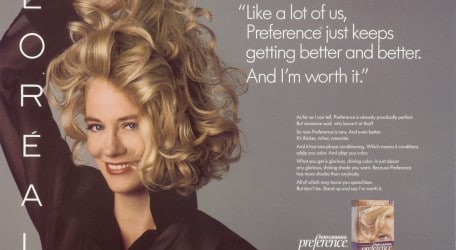
Because you’re worth it
That L’Oreal commercial, where a beautiful woman (usually a famous actress) turns her face to camera while tossing her thick, luxurious hair, has a lot to answer for.
“Because you’re worth it” she seductively reminds women, ostensibly speaking about choosing the right hair colour, but in reality loading the phrase with all sorts of other meanings.
The original campaign was launched in 1971, at the height of women’s lib, but at a time when advertising agencies were still run by men. In fact, most marketing campaigns were from a male perspective and indeed used a male voiceover. So it is interesting that the original slogan “because I’m worth it” was written by a female copywriter who wanted to drive a message home. [Since then the pronoun in the slogan has been tweaked to read “you’re” and “we’re” to reflect the times.]
We do deserve to treat ourselves well, don’t we, and so many women do just that, religiously booking hair appointments, a massage, a facial, a spa treatment and even one of those foot treatments where fish nibble at your dead skin.
But as much as looking well definitely helps us to feel better about ourselves, knowing our worth should not really stop at superficial embellishments. And there lies the crunch.
We were recently told that women still lag behind when it comes to top positions, and even then they are still not paid the same as men for the same work. This led to an online discussion about whether this is, after all, women’s own fault for not speaking up and demanding a promotion or a pay raise. Basically, the points which came up can be summarized in just four sentences.
1. No employer will give you a raise without asking
2. Men are generally more assertive and relentless at negotiating and demanding a better pay packet
3. If you cringe at the thought of demanding more money because you find it humiliating or demeaning, you will just have to get over it
4. If you don’t ask, you won’t receive, so either leave the organization or lump it (and stop complaining)
Quite a few people put the onus of responsibility on the employee who was basically being told to literally ‘man up’ and go after what she deserves. Unsurprisingly, many of those who argued in this way are self-employed, whereas those who felt that there should be a well-defined pay structure, with a raise being linked to performance reviews, were all people who work with a company. I agree with the latter, because I believe that in a serious, well-managed company a loyal, hardworking employee should be respected and this should be shown both through the way he/she is treated on a personal level as well as by being given what he/she deserves without have to grovel for it.
It would be interesting to carry out a scientific survey, using a representative sample, to see whether asking for a raise is a gender issue; in other words do women have more of a problem in assessing their own self-worth for the work they do? Are they still struggling with their self-image, fearing that being assertive will be perceived as being obnoxious, overbearing and unfeminine? Do we, as women, equate asking for more money with negative connotations whereas men have no problem with it at all, seeing it as their ‘right’?
On the other hand, rather than blaming women, should we instead be looking into whether the gender imbalance when it comes to top posts and salaries is a result of a Catch 22 situation? After all, if there are less women at the top, it can also point to a male-dominated senior management which has not been willing to promote women from within its ranks. Should we be asking whether those calling the shots are still of the mindset that paying a man more than a woman is acceptable because they still see men as the main breadwinners?
The answers to these questions would be very significant and would go a long way towards identifying why, after all these decades, we are still discussing inequality.
It might also go a long way towards explaining why we tell ourselves we are ‘worth it’ when it comes to splurging on beauty products, but still balk at the thought of assessing our own value when it comes to the workplace and our monthly cheque.
- March 7, 2014 No comments Posted in: Hot Topics





